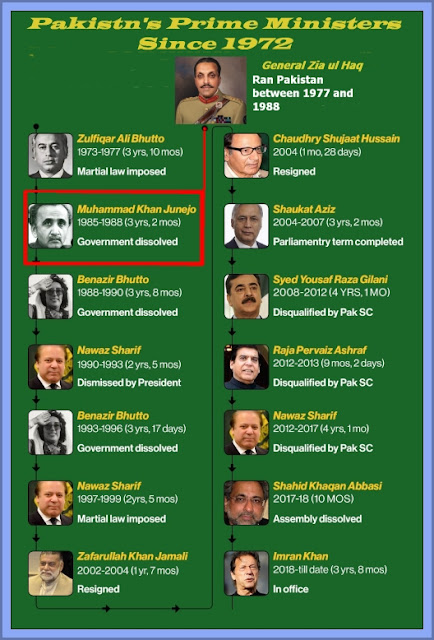Since independence in 1947 .....
 |
| A History Of Failure ... |
..... no prime minister has ever completed a full five-year parliamentary tenure in Pakistan.
Pakistan has had 31 prime ministers (according to its own website) since 1947, so the the removal of Imran Khan from office, just means that 75 year old record of civil incompetence and political corruption doesn't look like it will be broken any time soon.
In all, 18 prime ministers have been removed under a variety of circumstances, including corruption charges, direct military coups and forced resignations due to infighting in governing groups. There was one assassination (Liaquat Ali Khan - the first PM), and the rest of the prime ministers have only held the position for a limited time, usually as caretakers to oversee new elections, or to see out a dismissed prime minister’s tenure. In 1993 there were actually five changes in the prime ministership.
One has to assume that this is not because its 99 per cent a Muslim country, as after all other Muslim countries manage to have governments that reach full term (and rarely, even some that are actually fully democratic). So we have to assume that its the fact that the military in Pakistan essentially are running the country from behind the scenes, where they are referred to as "The Establishment".
This incapacitates any civil government, because a lot of the economy is owned and run by the military (and they pay little or no taxes), they also effectively control foreign policy, which means Pakistan is heavily invested in Afghanistan (by supporting the Taliban). This is because the military high command under Gen Bajwa, using the Inter Service Intelligence (ISI) under a former Imran Khan ally, Lt Gen Hameed, believes that control of Afghanistan gives Pakistan security depth against India.
Imran
Khan has denied it, but it's widely acknowledged within Pakistani
political circles, that he only came to power with the help of the all
powerful army and intelligence services - but he then started to believe
his own denials, and apparently crossed them once too often, and is now suffering the consequences of that hubris.
He had made political mistakes,
particularly in the governance of the Punjab region. He tried to ignore
the rising tide of discontent over the post pandemic world wide rise in
prices, which has strained voters pockets in every counry. "The Sharif's might've filled themselves up [corruption], but at least they got work done," had become a common complaint.
Finally
he visited Russia on the day it invaded the Ukraine, and refused to
either condemn it or Mr Putin. However the Pakistani army command under
Gen Bajwa had later said that the invasion "must be stopped immediately".
The armed forces then effectively transferred their political support from Khan, by letting the opposition parties know that they were now 'neutral' on the question of Mr Khans survival as Prime Minister. That they would now accept another politician from one of the former two major parties, who had taken turns running the country since its its formation. Mr Khan was almost immediately deposed.
The Pakistan Muslim League-N (PML-N)
and the Pakistan Peoples Party (PPP) had dominated Pakistan's national
politics for decades. They are both feudal and feuding dynastic groups,
that have taken turns in short term governments. These two older parties
both fully understand that they have to obey the generals, and so they
can be controlled without public acknowledgement of the fact.
They are both accused of corruption, but they don't challenge 'the establishment'
and largely tow the line .... when they don't, as happened with with
former prime minister Nawaz Sharif, they find themselves out of power
and suddenly in the courts, and convicted on corruption charges (an easy charge to level against any Pakistani politician, because its usually true).
The President of Pakistan is Arif-ur-Rehman Alvi who is the 13th holder of the post, and Shehbaz Sharif, the brother of Nawaz Sharif was duly crowned
Prime Minister, and now holds the post, at least until the next elections in
October 2023.
Whether he is just warming the seat for his convicted brother, or will retain the role is a moot point ... because whomever holds the post, does so only at the gift of the military command.
This has been going on ever since independence, and particularly after East Pakistan broke away in a war in 1971 and became Bangladesh in 1972. There appears to be no way now to ever break the military's stranglehold on key economic sectors, and thus on civil governance, effectively leaving Pakistan eternally governed by the military from the shadows, and remaining a failed state.







The Generals have taken their revenge .... the BBC reports that Imran Khan the former Pakistan PM has been barred from holding public office for 'corruption' over his declarations over 'gifts' from foreign dignitaries, and the proceeds from their alleged sale. As I mentioned in the article ... every Pakistani politician can be brought down by simply claiming corruption (a point that we have seen increasingly in UK politics with Nazir Ahmed, ex Baron Ahmed), because they all are.
ReplyDelete